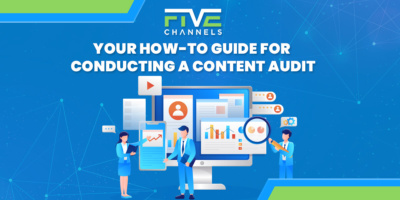Did you know that first results in Google get, on average, a 32.5 percent share of all organic traffic? Also, 91.5 percent of all traffic goes directly to the results listed on the first page of Google?
Over 40 percent of all revenue gets captured by organic traffic. What does this mean for your company?
Following the best practices in SEO matters. Big time.
Search engine optimization (SEO) remains crucial to establishing an authoritative online presence and driving more organic traffic to your website. In fact, every company needs a solid SEO strategy to fully maximize their online presence.
This holds true for outbound links, too.
How do outbound links affect your overall SEO strategy and content marketing approach? How can you use this important element of your SEO strategy to ramp up your Google rankings and earn a greater share of organic traffic?
Here’s our complete guide to everything you need to know about outbound links and SEO.

What is an Outbound Link?
Let’s start with a simple question. What are outbound links?
Outbound links connect your readers to pages on other websites. That’s why they’re often referred to as external links.
Think of the internet as an intricate web of connections. These connections run between informational pages, commercial pages, e-commerce sites, videos, and a wide variety of other online materials.
Without these links, it would prove impossible to jump between sites.
When it comes to links, there are two main types that you need to know about: internal links and external links.
Internal links let your reader hop around to various pages on your website. This provides added value for your readership and lets them convert into customers when they’re ready.
However, you also need to include outbound or external links on your website.
Why Outbound Links Matter
Outbound links allow readers to leave your website in the pursuit of information available on other pages located on external websites. They’re often used to back up sources, verify facts, and direct readers to other resources.
In the case of affiliate marketing, they take leads to landing pages and websites where they can purchase products from the companies you have an affiliate relationship with.
If you’re not an affiliate marketer, it might feel counter-intuitive to include outbound links on your website. After all, you don’t want people clicking on external links and leaving your website, right?
Here’s the thing. When you fail to include outbound links on each page of your website, your SEO tanks.
They wield important influence over search results.
Outbound Links and SEO
Outbound links increase the relevance of your website, especially when it comes to search engine algorithms.
Think of links as providing the trail of crumbs that allow search engine algorithms to process what you do, and the industry you’re in.
These links also help search engines understand the problems you’re attempting to solve, and the competitors that you have.
They even assist search engines in making decisions about the relevancy of your site to searchers. Hence, your SERPs rankings.
When it’s all said and done, links structure your overall site.
How Outbound Links Work
What happens when you include high-quality outbound links on your website pages? You increase your online reputation in the eyes of search engines.
You also build trust and distinguish your website from the competition as a legitimate source of information. Information that readers will value.
Google is in the business of sorting information. Being able to deliver the most valuable resources represents its bread and butter.
Including external links makes it clear to Google, and other search engines, that your blog posts are worthwhile. External links also allow you to build your online authority, but only when you include high authority, relevant ones.
Ramping Up Your Online Authority
Remember that old phrase, “Birds of a feather flock together?”
That’s definitely how search engines look at websites. If your site contains the right number of authoritative links, then you, in turn, look authoritative. It’s a form of guilt by association, only in a positive sense.
From the point of view of your readers, external links will also enhance your online reputation. Most people don’t have tons of time to explore a variety of high-value websites during their research.
When you can offer a few excellent suggestions, you instantly raise your status to the level of an expert.
Providing More Value to Your Readers
The inclusion of outbound links also provides your readers with greater value. Quality content will differentiate you from the competition faster than anything else.
This includes demonstrating that you know how to do research and you can back up your claims.
What’s more, if you can save your readers some time, then they’ll be back again. You may even get “bookmarked” by happy readers.
People will be drawn back to your blog once they realize that your articles provide a synopsis of all of the best material currently accessible on a given topic.
When they start repeat visiting your site, you’ll see major gains in authority from the algorithms. Once other people notice the trust placed in your site by search engines, your rankings will continue skyrocketing.
Here are some more excellent tips for increasing your readership.
External Links and Backlinks
When it comes to SEO, get a good thing going, and it tends to gain momentum. This happens rapidly in many cases.
As search engines rank you higher, more people visit your site, as more people visit your site, search engines then tend to rank you higher.
Furthermore, when you include high-quality outbound links from other sites, you also encourage more backlinks. Outbound links allow you to establish a network of bloggers, websites, companies, and journalists.
Every time you endorse their work, they’ll feel inspired to do the same for yours. The more websites that engage with your content and link to your pages, the higher your rankings will go.
As you make headway in search engine results pages (SERPs), gaining large volumes of monthly traffic will become effortless, at least compared to what you may be doing and spending now.
Where Should You Place Outbound Links
The SEO plugin Yoast takes including backlinks so seriously that they recommend putting them on every single page of your website. If you’re one of their users, you probably already know that failure to include outbound links results in a red light.
Why so much emphasis on external links? Yoast does so in keeping with their mission to make sure everyone has equal access to the benefits of SEO.
They argue that websites need to connect to one another. In so doing, they connect the larger dots of the internet, providing users with more complete pictures on given topics.
What’s more, websites need to interact so that they can be found by readers and search engines. Remember what we said before about links helping to structure your website?
Well, providing this structure is crucial to locating websites, understanding relationships between pages and various aspects of topics, and creating a better internet overall.
When Should You Include Outbound Links?
On the internet, it’s always important to give credit where credit is due. That means you should include backlinks to credit any sources that you use.
Also, just as you did in high school, don’t forget to link to pages where you get statistics, numbers, and other detailed information. Another good practice is linking to pages that provide more information for readers.
For example, if you write a general overview about where to go in Peru with kids, you might consider linking to sites that delve more deeply into topics such as:
– How to get to Machu Picchu with kids
– The history of the Incan Empire
– What to eat in Peru with kids
– How to avoid altitude sickness in Peru
You don’t have time in your article to fully explore the offshoot topics, but it doesn’t mean that they’re not important. It also doesn’t mean your readers don’t have time to delve more deeply into these subjects on their own.
Again, the more value you provide for readers, the more likely they’ll be to return for second, third, and fourth visits.
As you go back through older posts and revise them with this in mind, think about where readers might naturally wish to know more about a given topic. Then, add excellent links that’ll let them take their research further.
As for writing new content, if you follow the principles above, you’ll easily find places to include external links that up each of your page’s authority and prestige as a source of accurate information.
How to Choose High-Quality Outbound Links
At this point, you might be wondering which types of links you should include in your blog posts and other pages. Here are a few things to keep in mind as you consider which backlinks to add.
A good rule of thumb is to go with relevant links from websites that you could actually see visiting your website and providing you with backlinks. However, finding great outbound links gets a lot more complicated than that.
You should also make sure that the links you’re connecting to have relevancy within the context of your page. This is known as semantic relevance. That’s because search engines also contextualize text based on nearby links.
You should also make sure that there’s a close correlation between the context of the paragraph where you add an outbound link and the site it goes to.
Besides thinking about context on both the paragraph and page levels, you also need to make certain that the pages you link to are normal. That means avoiding pages with:
– Poor quality content
– On-page spam
– Off-page spam
Remember that bit earlier about birds of a feather? Be mindful of who it looks like you’re “flocking” with.
What happens if you link to pages that don’t meet the criteria above? You can harm your search engine rankings. Especially if you link to spammy sites.
Outbound Links Aren’t the Golden Ticket
You’ve now got a better sense of what outbound links can do for your website. Especially when you choose them with care and place them appropriately within your text.
Not only can they infuse your site with greater authority, but they can also help search engines better understand your site, and rank it higher. They also add value to your readers and can help you earn more backlinks.
Of course, there’s a caveat to all of this. Outbound links alone won’t validate your site. Although expertly linking to other sites can prove useful to yours, you still need to publish high-quality, accurate content.
Remember you must choose links with care. All external links are not all created equal. The last thing you want to do is lose marketing traction because you’ve inadvertently linked to a spammy site.
Outbound Links’ Impact on Your Website
Although the idea of sending readers away from your pages via outbound links might seem like a disastrous idea, it’s essential to nurturing great SEO.
What’s more, when readers realize you provide the best collection of current materials out there on any given subject, they’ll come back to your site time and again.
In a recent survey of content marketers by Moz, 36 percent of respondents agreed that link building and content marketing are essentially one and the same. Keep this in mind as you craft content for your blog and add corresponding links.
Interested in more information that’ll help your blog posts perform better in Google and with readers? Check out our 10 must-have tips on how to write an effective blog post.
Owner and Chief Marketing Officer, Jason Hall, and his team specialize in creating brand awareness / traffic and lead generation / marketing funnel and conversion optimization, while utilizing the appropriate marketing channels available within your industry. With diverse clients throughout the world, Jason's team is well connected within many industries to assist with your marketing strategies. With no long term contracts and various levels of service, Jason's team will increase the quality of your online traffic, leads, and sales.
About the author...
Located in the heart of the Emerald Coast - Destin, FL, founder and Chief Marketing Officer, Jason Hall, and his team specialize in creating brand awareness / traffic and lead generation / marketing funnel and conversion optimization / and PR campaigns, while utilizing the appropriate marketing channels available within your industry.
With diverse clients throughout the world, Jason's team is well connected within many industries to assist with your marketing strategies. With no long term contracts and various levels of service, Jason's team will increase the quality of your online traffic, leads, and sales.









